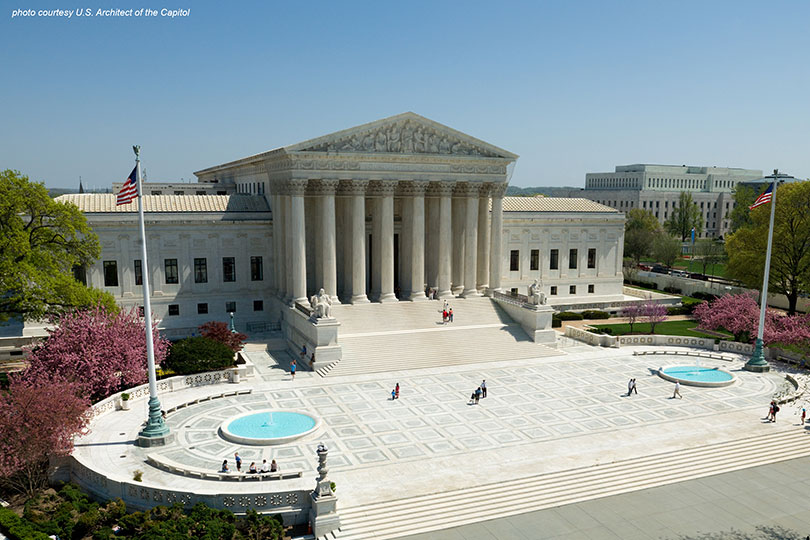By Jennifer Whitlock
Field Editor
The first week of 2022 should bring movement from the U.S. Supreme Court on several cases relevant to agriculture.
On the Friday of each week the court is in session, the justices hold a conference to decide which petitions to accept. Three of four agriculture-related cases submitted in recent weeks are now scheduled for a Jan. 7 conference, giving farmers and ranchers hope for a near conclusion to the issues.
Challenges to Proposition 12 in California, a definition of navigable waters under the U.S. Environmental Protection Agency’s (EPA’s) Clean Water Act and EPA’s year-round E15 rule are slated for discussion that day.
California’s Prop. 12
Proposition 12, which went in to effect Jan. 1, bans the sale of pork from hogs that do not meet the state’s new production standards. Any whole pork meat from hogs born of sows not housed in conformity with the law cannot be sold in the state of California, regardless of whether the animal was raised in-state or out-of-state.
In September, the National Pork Producers Council (NPPC) and American Farm Bureau Federation (AFBF) petitioned the Supreme Court to take their case against Prop. 12.
“Supporters of Proposition 12 claimed it would improve animal welfare and food safety. The law fails to address either of those issues,” AFBF President Zippy Duvall said. “Farmers know the best way to care for their animals. This law takes away the flexibility to ensure hogs are raised in a safe environment while driving up the cost of providing food for America’s families. Small family farms well beyond California’s borders will be hit hardest as they are forced to make expensive and unnecessary changes to their operations. This will lead to more consolidation in the pork industry and higher prices at the grocery store, meaning every family in America will ultimately pay the price for Prop. 12.”
The organizations also argued the regulation unconstitutionally restricts interstate and international commerce.
The Commerce Clause of the U.S. Constitution, which grants Congress the power to regulate trade among states, only grants states the authority to regulate commerce in matters related to public health and safety.
“State regulation ‘is invalid under the Commerce Clause’ if its ‘practical effect’ is ‘to control conduct beyond the boundaries of the state,'” NPPC added in a Dec. 21 reply brief.
Clean Water Act
Another major agricultural case scheduled for the Jan. 7 conference pertains to the Clean Water Act.
As the Biden administration works on a new definition of “waters of the United States” (WOTUS) , attention is focused on the “significant nexus test” in making jurisdictional determinations for WOTUS.
“This case-by-case test threatens to unfairly regulate large areas of private land miles from the nearest navigable water,” AFBF President Zippy Duvall said in a November press release protesting an interim decision to use the significant nexus test.
Any decisions made by the Supreme Court in the latest petition brought before it will have far-reaching implications for farmers and ranchers across the nation.
“We believe any definition of WOTUS should be easy to understand and based on common sense that’s applied consistently, not a complicated case-by-case analysis that often results in conflicting determinations,” Texas Farm Bureau National Legislative Director Laramie Adams said. “TFB, along with AFBF and other groups, has advocated for a simple, effective definition that would put a stop to the back-and-forth over presidential administrations once and for all. We are watching this issue closely and continue communicating with lawmakers about the impacts any complicated rulemaking has had and will have again on farm and ranch land.”
Year-round E15 rule
In July 2021, a three-judge panel of the U.S. Court of Appeals for the District of Columbia Circuit issued an opinion in a case stating the EPA’s Reid vapor pressure (RVP) waiver rule does not apply to E15 gasoline.
The decision ended the year-round E15 sales that the EPA had approved in June 2019.
But the National Corn Growers Association (NCGA) and AFBF, along with several other farm and renewable fuel associations, asked the Supreme Court to take another look.
The petitioners allege the lower court’s ruling conflicts with the Supreme Court and previous rulings in the circuit, defeating Congress’ intent to expand ethanol use.
The EPA filed a reply brief on Dec. 21 to the court saying the incorrect conclusion of the appeals court will have serious negative consequences.
Roundup
Another petition brought by Bayer AG regarding its glyphosate product, Roundup, has not yet been distributed for a Supreme Court conference. The court invited the U.S. Solicitor General on Dec. 13 to file a brief in the case asking for more information.

